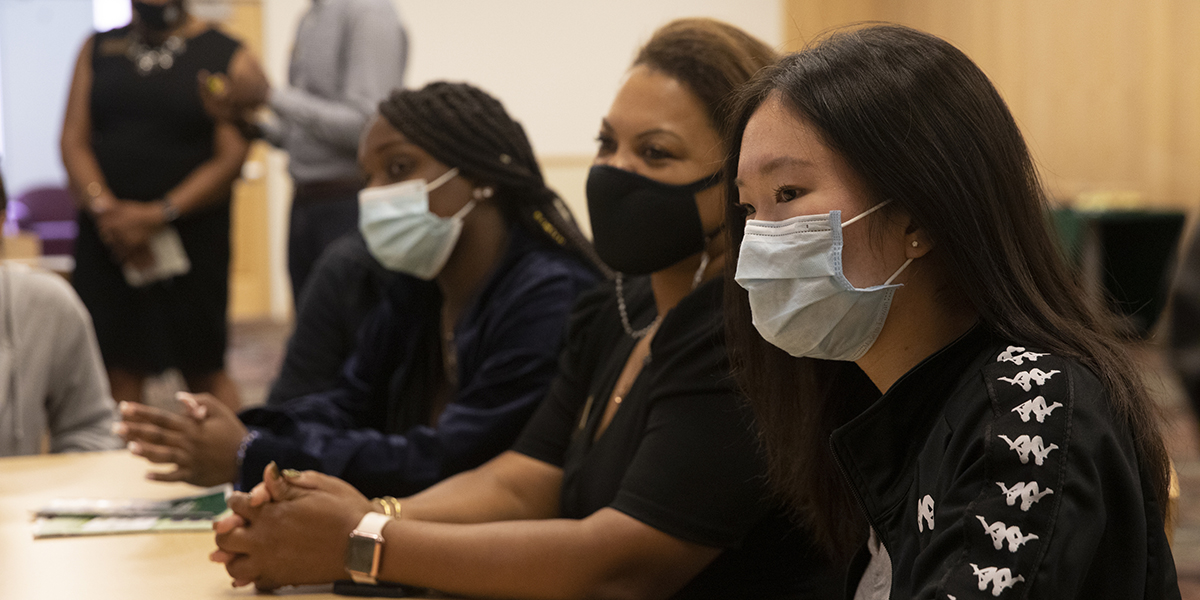New Student of Color Mentoring Program launches
Program helps first-year students of color adjust to college life and do better socially, academically and emotionally.

The pandemic disrupted the lives of college students across the nation, and made connecting with others and adjusting to college life more difficult. For underrepresented minority (URM) students, however, COVID-19 only amplified the problem many students of color already have when they arrive as first-year students.
Research shows that when college students make connections early on, they’re more likely to be retained — in other words, remain at the University — and do better socially, academically and emotionally.
“My work and research show that URMs, particularly Black students, have challenges when it comes to a sense of belonging as first-year students at predominantly white institutions (PWI’s) like Binghamton,” said Ada Robinson-Perez, Binghamton University’s affirmative action officer. “Many are from urban communities and it was their first time in a rural setting and numerically in the minority.
“The opportunity to build relationships right out of the gate is so critical for their emotional and mental health, their physical and academic health — their entire well-being.”
To address these issues, the Multicultural Resource Center (MRC) and the Division of Student Affairs recently launched the New Student of Color Mentoring Program (NSOCMP) to serve as a space where students from marginalized communities feel welcomed and affirmed in their identities.
“The more we can do to foster a sense of belonging, the better students and leaders we’ll have today and tomorrow,” said Robinson-Perez.
The program connects first-year students of color with faculty and staff of color, and the mentors/mentees meet several times during the semester. According to Richie Sebuharara, MRC assistant director, there are currently 20 students and 15 faculty and staff participating.
“The plan is to be able to develop these relationships for a student’s entire time on campus,” Sebuharara said. “We match students with mentors who may share a hobby or an academic interest so there’s an organic type of connection but also an intentional one,” he said.
Providing regular, one-on-one academic and professional advice is the main goal, but social mixers are also planned at the MRC, where all mentors and mentees can gather together.
“Our hope is that, although you’re assigned to a particular mentor, you also have access to this larger network of people who might be able to help you in other ways,” Sebuharara explained.
In addition to the NSOCMP, the MRC hosts several other programs to address overall well-being.
For example, the Faculty Dialogue is a chance for faculty of color to come to the MRC and share their research with students.
“Then there’s Culture Chat, a program we’ve been doing for a number of years now. It’s a lunch in a casual, intimate setting where we’ll bring three or four faculty or staff color to the MRC and allow students the opportunity to ask them about their experiences, their journeys, how they got to Binghamton, etc.,” Sebuharara said.
Let’s Talk is a collaboration with the University Counseling Center and is where students can talk about their problems and concerns — whether interpersonal, mental health-related or about adjusting to college life.
“I always go back to the research that shows URMs tend to underutilize mental health resources and so this way the therapist comes into their space to make it more comfortable. It’s not therapy, but it’s an opportunity to chat or see if there’s a need for counseling,” said Robinson-Perez, who is a NYS licensed social worker with a PhD in Community Research and Action..
These programs are geared toward traditionally underserved populations; but the Division of Diversity, Equity and Inclusion (DEI), under which the MRC falls, is a division that benefits the entire campus, Robinson-Perez said.
“The whole goal of DEI work is to support and embrace not only diversity but to ensure we’re creating a more inclusive campus community,” she said. “So the more that we can create opportunities and spaces to have conversations and dialogues and develop relationships, the entire campus benefits.
“Unity. Identity. Excellence. Those are our University values. We can’t do that in a silo — it’s a campus effort.”
